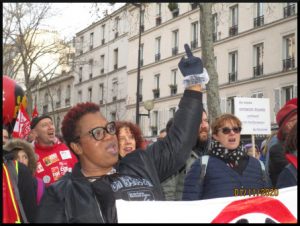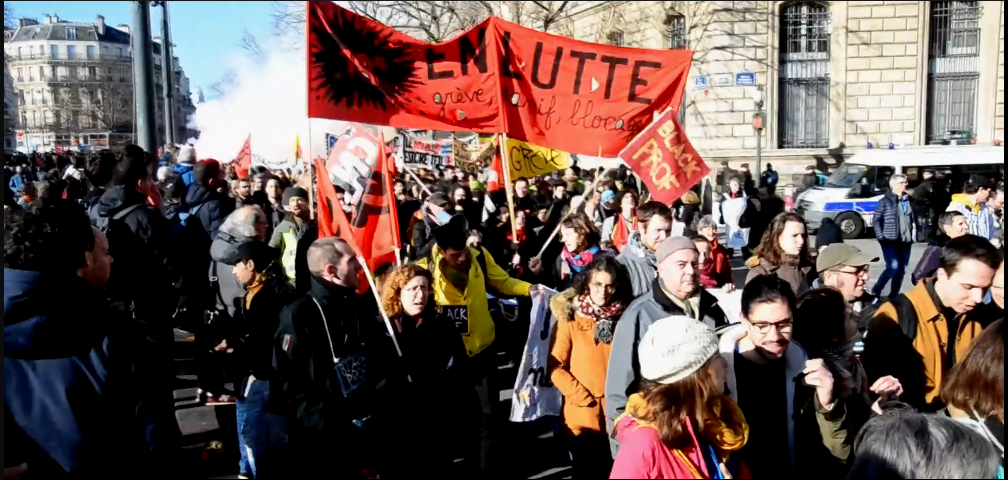by Marty Goodman, published on Socialist Action, March 20, 2020
The massive strike wave begun Dec. 5 in France against a proposed rollback of pension rights has slowed down.
Disruptive strikes and giant marches of mostly public workers across the country topped over 1.5 million, but the leading edge of the movement, city and regional rail and bus workers, announced the end of their strike on Jan.24, after living weeks on meager strike fund benefits.
The neoliberal French President Emanuel Macron, a millionaire former financial investor, is attacking workers’ hard won pension rights in the immediate aftermath of WW II, and for transit workers, in 1907. Pension rights in France remain amongst the best in the western world, including the U.S.
The last major mobilization, the tenth such action, was on Feb. 20, with numbers significantly down. According to the Interior Ministry, 7,800 marched in Paris on Feb. 20. A month earlier marches in Paris were in the hundreds of thousands. (See January and February Socialist Action.)
Widely viewed videos showed French cops brutalizing marchers, including the use of so-called “non-lethal” weapons, such as explosive tear gas grenades, the only European country to use them.
On Feb. 29, Prime Minister Edouard Philippe announced the use of Constitutional article 49.3 that will bypass parliamentary debate on pension changes. Unions called an emergency demonstration on March 3 that attracted over 20,000, far smaller than recent protests.
Workers’ oppose “reforms”
 Opinion polls say that as much as 70% of the French people oppose the pension “reforms” and a similar number support the strikes, despite inconveniences.
Opinion polls say that as much as 70% of the French people oppose the pension “reforms” and a similar number support the strikes, despite inconveniences.
The pension “reform” aims to roll back the age requirement for full benefits from 62 to 64 and to consolidate 42 pension guidelines into one “point system” based strictly on employee contributions.
Scandal erupted when it was revealed that two top Macron officials had an interest in insurance companies whose profits would increase by pension changes.
It is estimated that the pension slashing measure cuts 30% of benefits. Women workers, whose pensions are already 29% lower than men’s, and who are concentrated in the low-wage service industry, will see their pensions further reduced. The CGT (General Confederation of Labor) says the gap with men may increase to as much as 42%. For unemployed workers, above 8% of the entire workforce, benefits are reduced. Workers with physically taxing jobs must continue working until 64 for full benefits.
As Prime Minister Philippe put it bluntly, “You’re going to have to work longer.”
In an open attempt at splitting the labor movement, Macron, after weeks of strikes and massive demonstrations moved the optimum age back temporarily back to 62 and implementation from 2022 to 2027.
The French Democratic Labor Confederation (CFDT), an anti-communist and conservative union federation and France’s largest, first opposed the plan on the age requirement, but not the point system. Macron’s “modifications” ended CFDT opposition. In response, some CFDT members tore up their union cards.
However, the CFDT, CGT and other unions will participate in some three months of “negotiations,” although the CGT has now withdrawn from talks. None of the terms of the proposal have changed; Macron’s “concessions” are seen as temporary, not fixed. As the government sees it, the issue is closing a so-called funding gap of about $19 billion (U.S.) by 2027. Macron has refused to increase employer contributions to the fund.
The more militant SUD Rail said it would refuse to meet with the government and would continue to mobilize until the withdrawal of the bill.
The proposal was to be introduced in March and expected to be voted on in April. Macron’s party, “Republic on the March,” has the majority and passage is assumed. To delay passage, Left-Wing politicians added a record 41,000 amendments.
Boris Vallaud, a Socialist Party member of the National Assembly said, “The President says that we don’t have the means, but it found the means to give 4 billion euros to the 1% of our wealthiest citizens” through tax breaks to the rich.
Léon Crémieux, a militant in SUD Rail and a leader of the New Anti-capitalist Party (NPA), says the conference is a trap which “is going to close quickly since this conference will only be able to put the “pivotal age at 64” back in the frame, forcing retirement two years later.”
Capitalism’s “race to the bottom”
The attacks on French workers are part of capitalism’s world-wide “race to the bottom,” i.e., insuring a competitive edge for French capital over its European, U.S., and Chinese rivals. The U.S. dominated World Bank and the European Union call for measures to trim France’s budget — on the backs of working people.
“We’re really sick of being in the soup by the 15th of the month,” said Christian Porta, a demonstrator, who works in a bread factory. “It’s gotten really terrible.”
Fabien Roussel, General Secretary of the Communist Party, asked in Parliament, “When have we seen so many teachers go out into the streets? Everybody is upset.’’
The recent strike was the longest since the historic May-June 1968 strike. For rail workers, it was the longest strike since the 1930’s. However, the latest mobilizations, however large, did not reach the peaks of the huge demonstrations against attacks on the working class in 1995, 2003 and 2010. The recent peak was some 1.5 million nationally but in 2010 a pension fightback mobilized 3.5 million.
An obstacle to a genuine general strike (all workers walking out) is the unionization of only 11% of the French public workforce and only about 5% of private workers. Moreover, the CGT is a reform-minded, not a revolutionary union federation, and is dominated by the Stalinized French Communist Party (PCF), whose leadership has historically sought, in the end, accommodation and parliamentary solutions. Nevertheless, the CGT is the leading trade-union body opposing the pension proposals.
What is missing in France today is a mass revolutionary party capable of steering the working masses away from the disasters of reformism and presents a challenge to capitalism itself. Under certain conditions working class leadership can change very fast. Stay tuned!
*Featured Image: Protesters in Paris resist retirement ‘reform’ February 6, 2020. ~ Jeanne Menjout (Flikr)
Marty Goodman is a former board member of the Haitian Refugee Center of Miami. He witnessed the fall of Haitian dictator “Baby Doc” Duvalier in 1986 and was an official election observer in the 1990 election of former Haitian President Jean-Bertrand Aristide. He opposed the US/UN occupation of Haiti and is a member of the ‘Black Lives Matter in the Dominican Republic’ committee. Goodman is also a member of Socialist Action.
